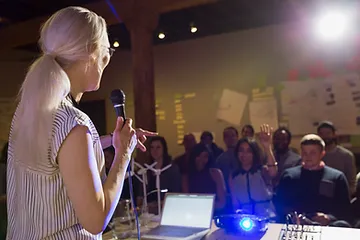
These days, we often look to new technologies to improve the experience of education and to achieve better results for our students.
When it comes to preparing for writing the college essay, that technology is podcasts.
Three reasons to listen to podcasts
There are a couple reasons you should be listening to the podcasts:
Reason one: More and more, admissions committees are looking for students who know what’s going on in the world beyond their high schools. Podcasts help you stay in touch.
Reason two: Podcasts teach storytelling.
Also, added bonus: Podcasts are free.
Where to start?
I recommend starting with This American Life. Ira Glass created the radio show in 1995, and I think it’s safe to say that there would be no such thing as podcasts today if Glass had not revolutionized storytelling on the radio.
Listening to various contributors on This American Life will inevitably lead you to other great shows: Serial, Wiretap, Heavyweight, TLDR, Reply All, Planet Money, Startup, No Fail, and many, many more. It will also introduce to you great essayists, journalists, historians and storytellers like Shalom Auslander, Niel Drumming, Sarah Vowell, David Sedaris, Etgar Keret, etc., etc. All these folks have much to teach you about great short-form writing.
What makes a great story?
You know a great story when you hear one. Standup comedians, charismatic people at parties, best men and maids of honor at weddings… all these people succeed or fail in the same ways.
But it’s hard to pin down what exactly makes for a great story. The best way to get a sense for the qualities of an effective story are to read and listen to them, over and over and over.
After listening to all 667 one-hour This American Life shows and thousands of other podcast episodes, I’ve come to a few basic conclusions about great storytelling, and I am excited to share my findings with you.
The three secrets to writing a great personal story
Here they are:
A beginning (a catchy setup);
A middle (development with repetition and variation);
An end (a punchline or resolution).
I know what you’re thinking: “This guy wasted over a thousand hours of his life listening to radio shows, and this is all he learned from it.” But I promise that my three tips are your secret weapon when it comes to the college essay.
There seems to be a wide-spread misconception about storytelling, which goes something like this: a great story must be shocking and dramatic, it must be full of earth-shattering life lessons that will change the world. This is not the case.
Go listen to some great stories. You’ll see what I mean.
An example
Take Anagha Mahajan, who told a six-minute story on The Moth called “My Left Eye.” This story could have been the subject for an excellent college essay.
“I’m blind in one eye” she begins (the setup). She then explains how she didn’t tell her parents about her condition until she was twelve, at which point they begin seeking all kinds of treatments: they take her to see a modern doctor, then a traditional guru (repetition and variation). For her treatment, they finally settle on a meditation technique, which requires Anagha to sit in a dark room and focus intently on a lit candle.
The heat in the Indian town where she lives prevents her from focusing, so they buy an air conditioner, which keeps breaking. They hire various people to come and fix it, and each one comes up with a new reason for why the cooler won’t work (repetition and variation). Finally a local boy named Sadiq manages to fix the unit. Then it breaks. He comes back. Every time he fixes it, the unit presents some new problem, and he gets frustrated (repetition and variation).
Meanwhile, Anagha still can’t see with her left eye, although she continues to meditate. She puts up an inspirational poem on her wall, which motivates both her and Sadiq as they repeat their Sisyphean tasks. Little by little he gets better as a handyman. She keeps meditating, and although her sight isn’t coming back, she notices that her grades are improving. She’s getting better at sitting still and focusing.
“In our own unsaid ways,” she concludes, “we are the cooler, the poem, the exercise, the studies. […] Sadiq did get better at fixing stuff, and he’s now the go-to guy in the village. As for me, looking back on the events of that summer, my eyesight never really improved, but since then, I do see things better.”
“I do see things better”—it’s a brilliant resolution that looks back (pardon the pun) at the opening line: “I’m blind in one eye.”
Notice how modest and straightforward the last line is. Anagha doesn’t present the story of her handicap as a tale of overcoming incredible hardship and gaining profound understanding of life’s deepest truths. She tells the simple, personal story of a girl coming to terms with her limitations and abilities, of the power of poetry, of the implicit teamwork at play in the repetition of her and Sadiq’s parallel tasks. It’s a concise and humble coming-of-age story.
Anagha doesn’t need to explain this. To her listeners, the conclusion is clear from the story she has told.
Your college essay
Use this story, and others like it, as inspiration for your own writing. Ask yourself: what unique story do I have to tell?
You already know that your first sentence should grab your audience’s attention and draw them in. Make sure your opening line is also your essay in miniature: “I’m blind in one eye.” This setup is also great because it’s intimate. Similarly, one great college essay began: “I do some of my best thinking in the bathroom” (Harry Bauld, On Writing the College Application Essay). Same idea.
The middle of your essay is where you develop your story. Don’t exaggerate, don’t try to be fancy. Just show your reader what happened with concrete examples. Anagha’s use of repetition and variation is effective and humorous. She goes to a doctor who tells her that her hardware works but that her software doesn’t; then she goes to a guru who hits her on the head with peacock feathers. One of the repairmen who comes to fix her AC unit says the machine can’t cool her room because it’s too hot out.
The end of an essay is often the most difficult to write. Avoid stating an explicit moral—the message should already be clear. Your last sentence or two should recall your opening, and remember what’s been said during the essay. Anagha begins with, “I’m blind in one eye” and ends with “I do see things better.” The boy who began his essay with “I do some of my best thinking in the bathroom” wrote an essay about how world leaders should spend more time contemplating in private, perhaps in the bathroom. He concluded: “Maybe they’d think of something.”
Radio storytelling shows us that everyone has a tale to tell. Listen to some shows. It’ll help you write your own story.
There are a couple reasons you should be listening to the podcasts:
#ivyleague #collegeapplication #collegeessays
If you need any help with your essays, our team of college consultants is here to help.

